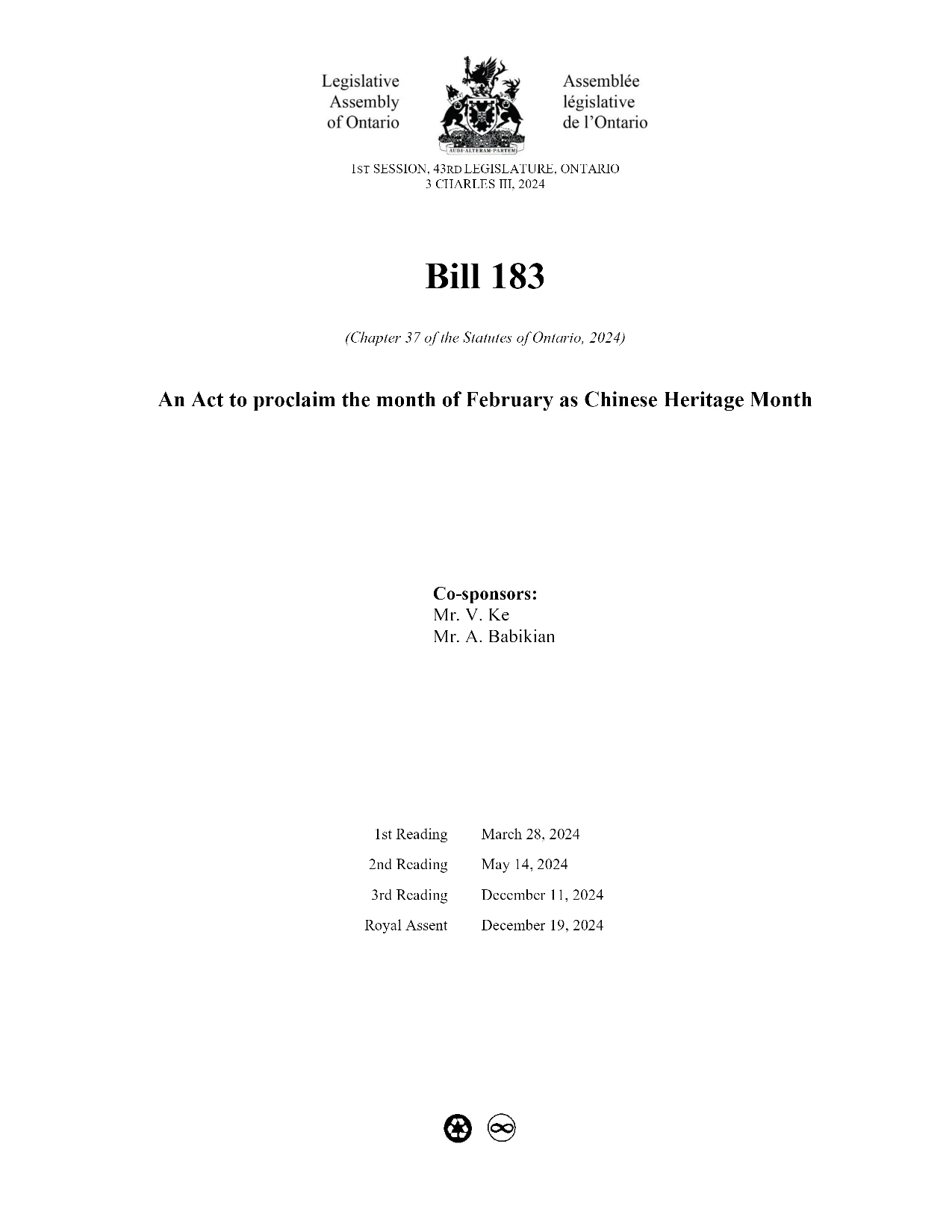
Feb 1, 2025
Chinese Heritage Month Officially Recognized in Ontario
February is officially recognized in Ontario as Chinese Heritage Month. This follows the passage of Bill 183, the Chinese Heritage Month Act, 2024, which received Royal Assent on June 3, 2024. This designation, resulting from community advocacy, provides an opportunity for all Ontarians to learn about and celebrate the rich history and contributions of Chinese Canadians. The first observance under this Act will be in February 2025. Heritage months play an important role in fostering understanding, acknowledging past experiences like the Head Tax and Exclusion Act, and promoting inclusivity. It encourages reflection on the integral part Chinese communities have played in shaping Ontario's and Canada's past, present, and future. Events during this month will showcase their vibrant culture, resilience, and achievements, enriching the nation's cultural mosaic and strengthening intercultural dialogue.
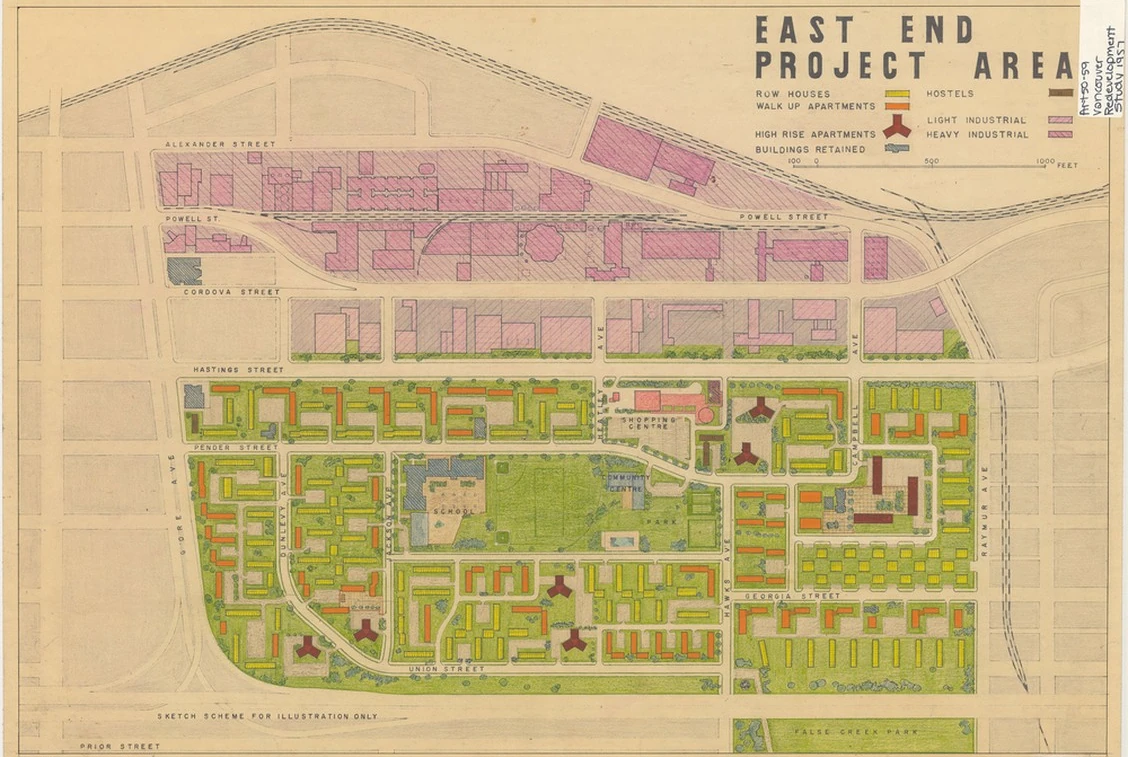
Feb 4, 1958
Vancouver's 'Redevelopment Project' Targets Chinatown
On February 4, 1958, Vancouver City Council approved a multi-phase, twenty-year slum-clearance "Redevelopment Project" targeting Strathcona and adjacent Chinatown. Between 1958 and the late 1960s, over 15 city blocks were razed, displacing many Chinese from the area. In December 1968, residents formed the Strathcona Property Owners and Tenants Association (SPOTA). In early 1969, Ottawa froze redevelopment funds and allocated $5 million for rehabilitation. SPOTA's campaign also defeated the proposed "Project 200" freeway, which would have cut through Strathcona, Hogan's Alley, Chinatown, Gastown, and the West End, displacing homes and businesses in predominantly working-class and immigrant communities.
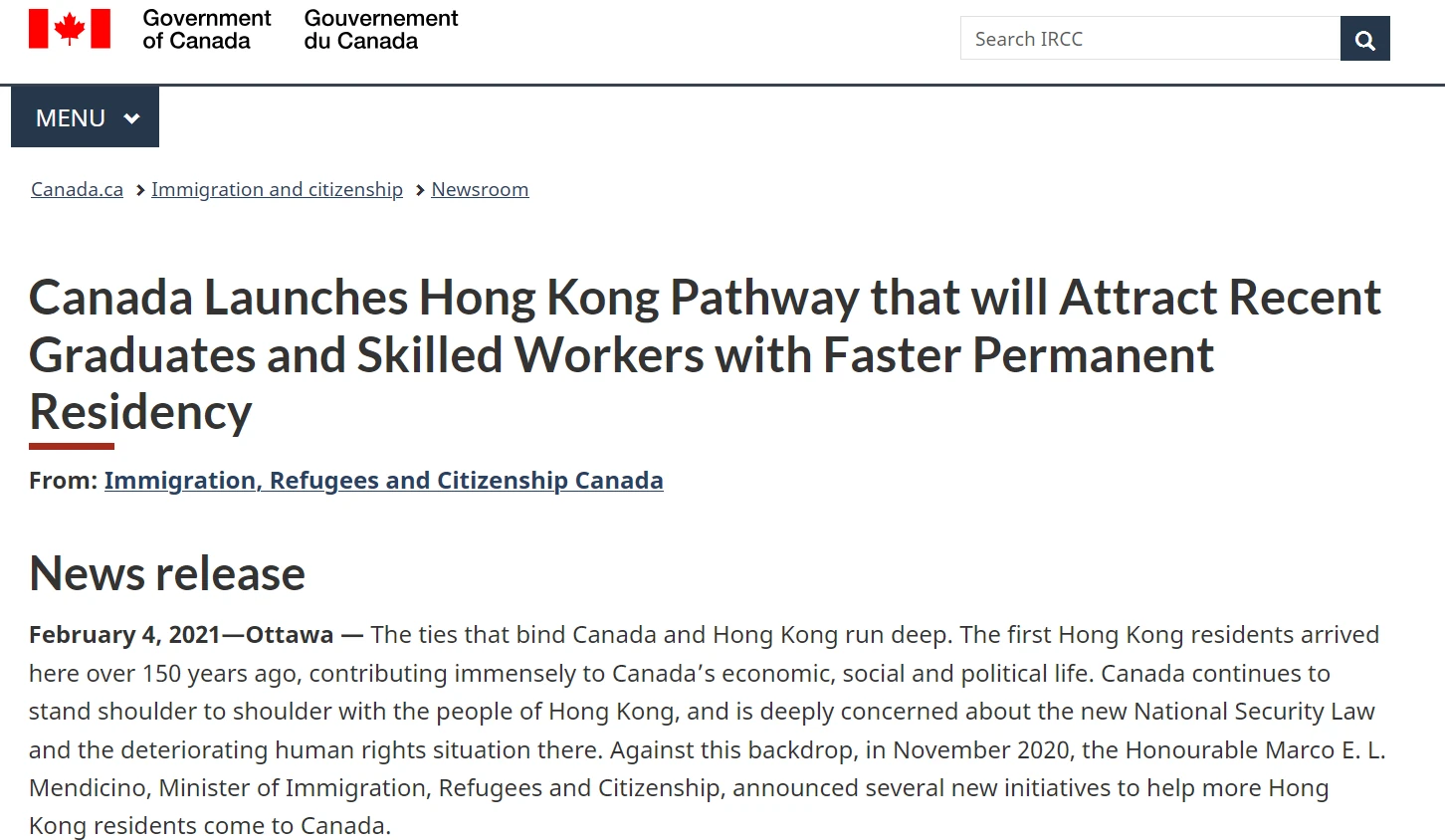
Feb 8, 2021
Canada Launches Hong Kong 'Lifeboat' Immigration Pathways
Feb 8, 2021: Canada launched 'Lifeboat' pathways for Hong Kong residents, a direct response to the imposition of the National Security Law and the deteriorating human rights situation in Hong Kong. These measures, including new routes to permanent residency, were designed to offer a safe haven for those seeking to leave the city. The program underscored Canada's deep concern over China's actions and its support for Hong Kongers by providing potential opportunities to study, work, and eventually settle in Canada.
Immigration
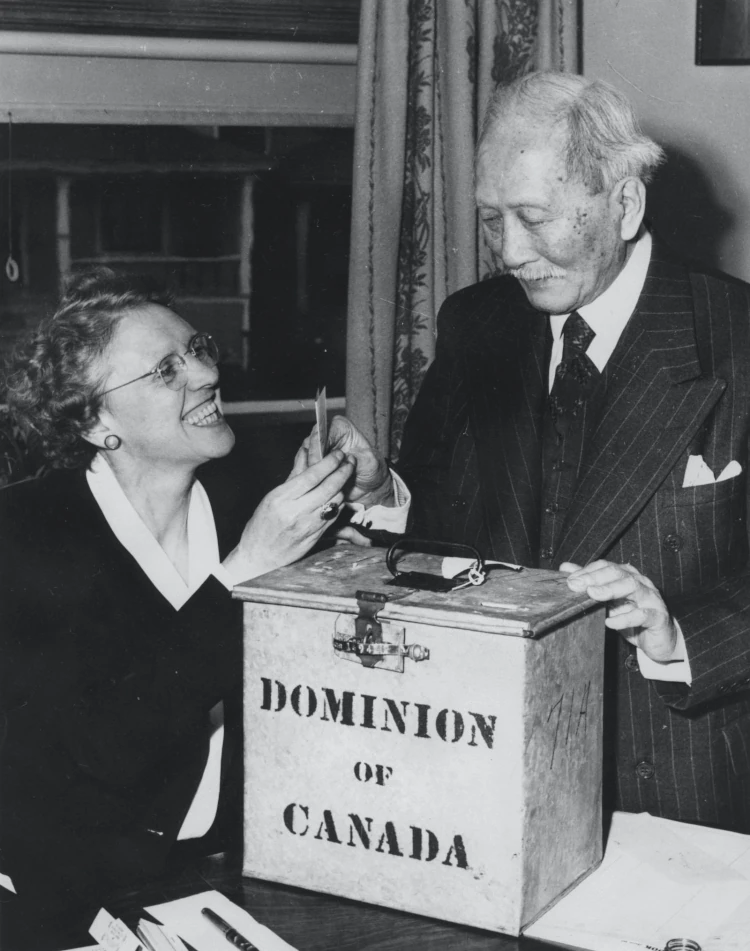
Feb 14, 1861
Won Alexander Cumyow: First Chinese Canadian & Rights Advocate
Won Alexander Cumyow (溫金有), born around 1861-02-14 in Port Douglas, BC, was the first known person of Chinese descent born in Canada. A pivotal community leader and interpreter, he fought for rights amid severe discrimination. Despite being Canadian-born, Cumyow faced racism that barred him from voting and the legal profession for decades. He actively campaigned against discriminatory policies, including school racial segregation in Victoria. He cast his first vote in 1949 at the age of 88, just after Chinese Canadians regained suffrage. Won Alexander Cumyow was designated a National Historic Person of Canada in 2024 for his significant contributions and his role as a bridge between cultures.

Feb 15, 1942
Malaya and Singapore Surrender to Japan
February 15, 1942, the British colony of Malaya, including Singapore, surrendered to Japan, a pivotal World War II event. This had implications for the global Chinese diaspora and Allied nations like Canada, which contributed to war efforts against Japanese expansion. The fall of Singapore was a major blow to Allied morale. For the local populations in Malaya and Singapore, which included a significant number of ethnic Chinese, this marked the beginning of a brutal three-and-a-half-year occupation. During this period, Chinese communities often faced particularly harsh treatment, including massacres like Sook Ching in Singapore, due to Japan's ongoing war with China and local resistance activities. The event highlighted the vulnerability of colonial territories and the widespread impact of the Pacific War.
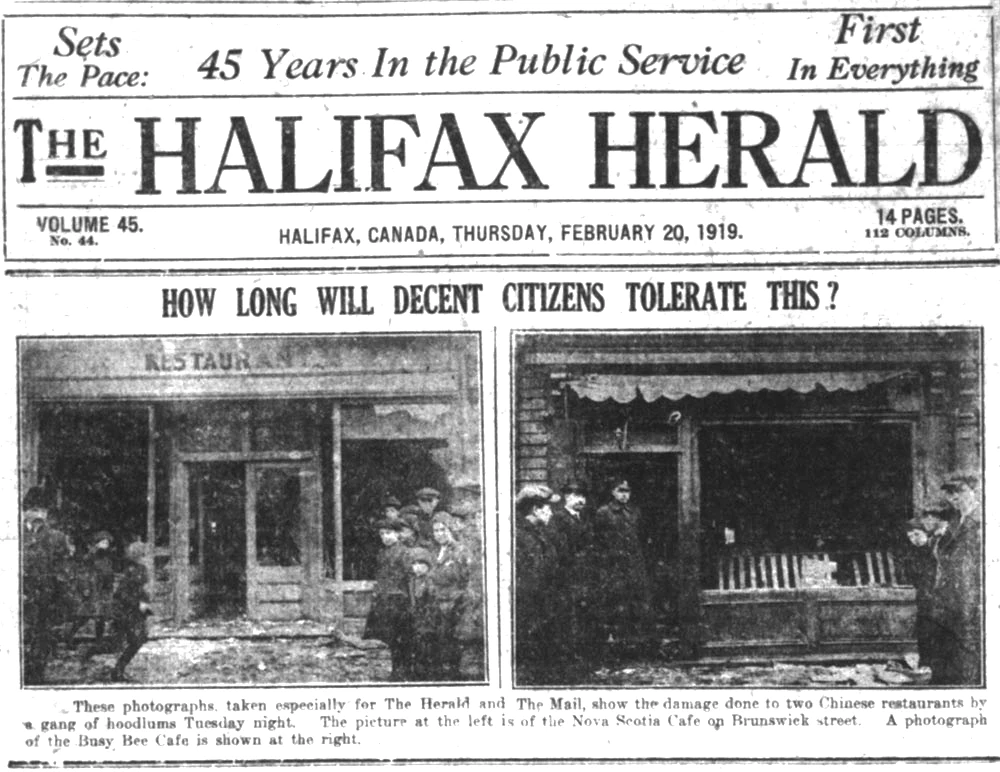
Feb 18, 1919
Anti-Chinese Riots in Halifax
February 18-19, 1919, Halifax experienced anti-Chinese riots, a disturbing episode fueled by post-WWI social tensions, economic anxieties, and racial prejudice. Returning soldiers, facing unemployment, sometimes directed frustrations towards minority groups. Chinese-owned businesses, particularly laundries and restaurants, were targeted, resulting in property damage and intimidation. These riots were not isolated, reflecting a broader pattern of systemic discrimination faced by Chinese Canadians nationwide, including legislated restrictions on immigration and civil rights. The events in Halifax underscored the precarious situation of Chinese immigrants, who were often unfairly blamed for societal problems and lacked adequate protection, highlighting the deep-seated racism of the era.
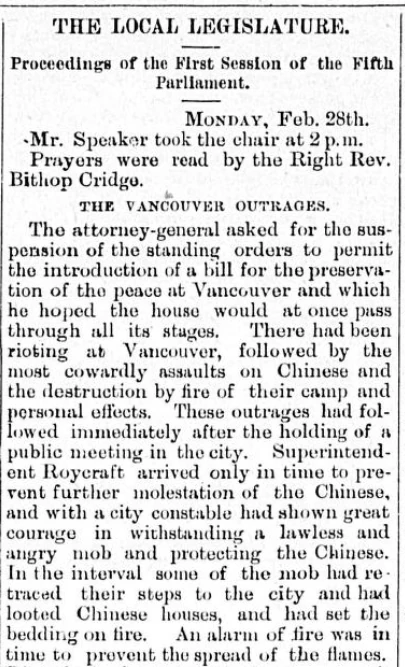
Feb 24, 1887
1887 Vancouver Anti-Chinese Riot: A Significant Early Large-Scale Incident
February 24, 1887, arsonists burned down laundries during an anti-Chinese riot in Vancouver, marking one of Canada's earliest and most significant large-scale expressions of racial hostility faced by Chinese immigrants. This event occurred amidst a climate of economic anxiety and discriminatory policies, such as the recently imposed Head Tax, targeting Chinese labourers who were often scapegoated. The riot not only resulted in significant property damage but also terrorized the Chinese community, highlighting their extreme vulnerability and the lack of protection. It underscored the intense anti-Chinese sentiment in British Columbia, contributing to further exclusionary measures and leaving a lasting scar on the community, demonstrating the harsh realities faced by early Chinese settlers in Canada.
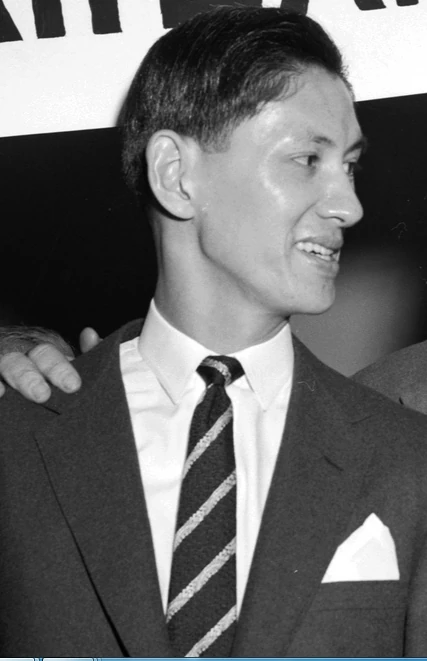
Feb 25, 1924
Douglas Jung: First Chinese Canadian MP
Douglas Jung (鄭天華) was born in Victoria, British Columbia, on February 25, 1924. He made history on June 10, 1957, by becoming the first Chinese Canadian Member of Parliament, a landmark victory. His election was a major breakthrough for Chinese Canadians in federal politics, occurring just a decade after they regained federal voting rights in 1947. Jung was a Canadian-born lawyer who served with distinction in the Canadian Army during World War II as part of Force 136. Despite facing discrimination, his dedication and legal background paved his political path.